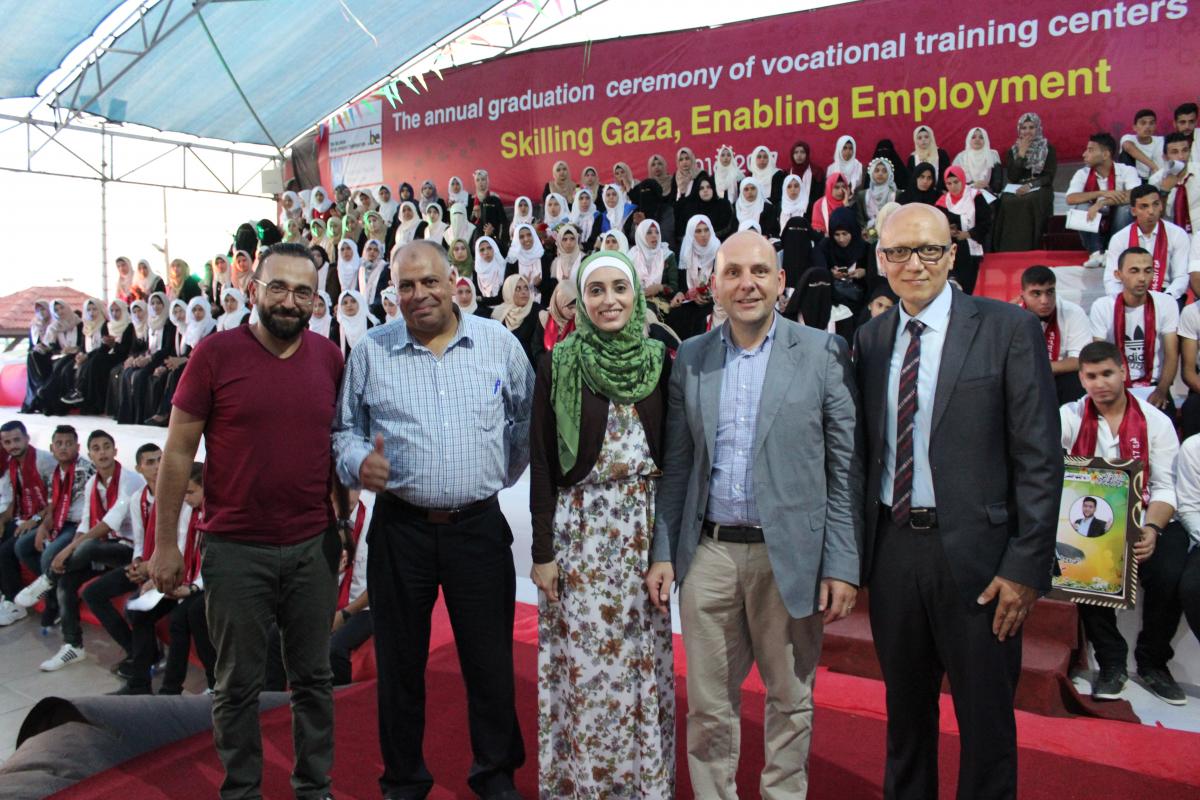The annual graduation ceremony of vocational training centers' graduates
For one and a half years, 73 Work-Based Learning (WBL) initiatives (a modern form of apprenticeships with a strong collaborative on between the TVET institutions and the private sector) were launched in the Palestinian Territory, of which 16 in Gaza.
This week the graduation ceremony of these TVET training centers’ graduates took place in Gaza.
Mr. Bart Horemans, International Technical Advisor ECIB at BTC, addressed the attendees on behalf of the three international partners supporting TVET in Gaza: Islamic Relief, the German Development Agency (GIZ) and the Belgian Development Agency (BTC). In his opening remarks, he thanked everyone who played a role in the graduates’ journey to graduation:
- The trainers and mentors for their patience to accompany the students day in day out in the difficult task of acquiring new knowledge and skills.
- The parents and families for sparing no efforts in giving the students the opportunity to study and obtain a diploma.
- The representatives of the private sector and the hundreds of company owners for being willing to participate in the work-based learning program or other apprenticeship programs, offering the opportunity to hundreds of students to obtain real work experience in their workshops.
“With unemployment rates of over 40% and even higher for young people, finding a job is not an easy task. TVET, under his different forms, gives the best guarantee to find a decent job. The private sector needs skilled people and Gaza needs people who are willing to start their own business. In many economic sectors, there is a clear potential for developing new services and improving existing productions processes, as we can see in agriculture and food processing, ICT, manufacturing, renewable energy, tourism and the outsourcing sector to name but a few.
Employment remains the single most effective way to combat poverty and create opportunities for all. Notwithstanding the harsh circumstances in Gaza today, concrete things can be done to give more people the chance to find or create their own job, earn a living and take care of their families.
Technical and Vocational Education and Training (TVET) is one of the most promising enablers that can contribute to this objective. This requires, however, a well-functioning educational and training system that provides youth and adults with the relevant skills in line with the needs of the labor market. This can only be achieved by creating a strong partnership with the private sector, what will lead to more jobs and at the same time increase the competitiveness of the companies.”
As a closing remark, the importance of continuing the WBL initiatives was also emphasized, together with the challenge of labor market participation of women:
“Although the introduction of WBL can be considered as very successful and the added value of Work-based learning has been recognized by all, we must now make sure that it will continue in the future. Therefore, we need to develop strategic partnerships with all stakeholders and create the necessary institutional environment.
Several organizations have now integrated WBL in their programs. We also welcome the decision of the Ministries of Education and Labor to officially integrate WBL in their curricula and of the EU member states to support the integration of WBL in at least 50% of the TVET programs in the Palestinian Territory by 2020. These are important steps, but much more is needed.
It is therefore with great pleasure that we note the strong emphasis in the National Policy Agenda and in the sector strategies of the Ministries of Labour and Education on job creation through public-private partnerships. TVET but also Continuous Vocational Education and Training (CVET) are the most evident starting points to develop this partnership. But this should also include support to business start-ups, entrepreneurship and private sector development in its various forms.
A very important remaining challenge is the dramatically low number of women participating in the labor market. More than 80% are outside the labor market, one of the lowest numbers in the world. Together, we must develop strategies that facilitate the access of women to TVET, including non-traditional vocations, and give women a real opportunity to find a job or the start their own business."
Latest news from this project
No news

